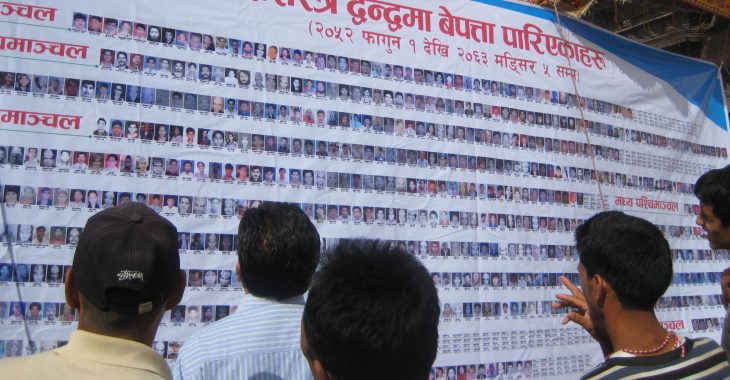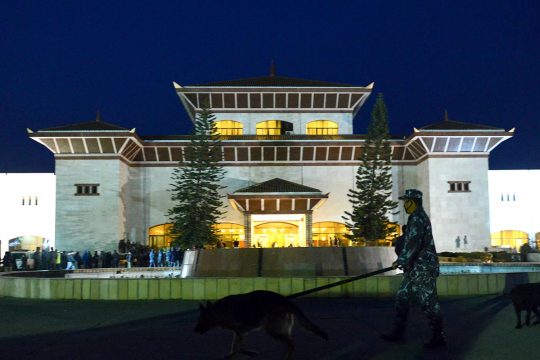Every August 30th since the signing of the comprehensive peace accord (CPA) in 2006, families have marked the International Day of the Disappeared to commemorate more than 1,400 disappeared relatives and light a ray of hope for justice. There has been little progress in addressing the demands of families of the disappeared since the end of the conflict. After 8 years of transition, families continue to struggle for justice and any significant impact at the policy level remains elusive. There is a real threat that the April earthquake and subsequent aftershocks have irrevocably changed the political climate in Nepal and reduced political will to deal with the horrific history surrounding the disappeared in a meaningful way. “Let’s look forward, not back” is a common response on the subject among both those in power and politics. But the families and their communities cannot help but look back – they cannot and will never forget. The families remember, the community remembers, the country remembers and the memory of the disappeared lives on.
Individuals known to the families
14 years later, I continue the search for my disappeared father and represent thousands of surviving families who are still waiting for answers about the fate of their disappeared relatives. After the security forces detained my father, beat him up publicly and tortured him, they eventually disappeared him from their camp. After that my father was never seen again. This was a crime drama gone horrible wrong – one where the gangsters and the police were played by the same actors. In 2003 and 2004, when then Royal Nepal Army entered the war, hundreds of people were forcibly disappeared in Nepal. Like my father, many innocent people went missing. In many cases the crimes were perpetrated by individuals known to the families and their relatives; these perpetrators still sit in power and serve in senior positions in the security forces. In its 14th anniversary report, the National Human Rights Commission (NHRC) named the alleged perpetrators in an effort to investigate and take action against the crimes, including the perpetrators of my father’s disappearance: then Chief District Officer Shiva Nepal, then Deputy Superitendent of Police Pitamber Adhikari, who is in senior position in Kathmandu, and about a dozen other police officers; then army major Santosh singh Thakuri, and many senior officers of the Nepal army including Raju Basnet, Ajit Thapa, Ramesh Swar, former chief of army staff Pyarjung Thapa and former head of Nepal police Kubersing Rana. Hundreds of alleged perpetrators have been named and recommended for punishment according to the current criminal justice system, but the Government has done nothing. In my father’s case, the UN Human Rights Committee on November 2014 also recommended that the Government of Nepal investigate and provide justice to the families. The government has not responded and has not approached the families.
Known perpetrators
After all this time, the problem isn’t that my father wasn’t seen again; the problem is that those responsible refuse to speak about the crimes they committed and that the Government of Nepal is unwilling to enforce its own 2007 Supreme Court ruling which classified all disappearances as criminal acts. The fact that the military, police and political parties remain staffed and led by known perpetrators results in a lack of political will to take meaningful action on the issue of disappearance. Without criminalizing enforced disappearance, the superficial commission appointed by the political parties cannot thoroughly investigate and satisfy the demands of hundreds of families for truth and justice, and sustainable peace will remain elusive.
What happened to my father is not unique, but the way in which it happened highlights the total disregard the state has for families. Everyone knows what happened. I have had to live for 14 years knowing what happened and who did it. However, instead of taking action against the alleged perpetrators, the Government protected them. Both the influential politicians and security institutions at the top compromised to not criminalise enforced disappearances, playing a role to weaken the commission process. In such context, the commission cannot deliver a result, as per the flawed commission act. Finally it is crucial to recognize that legal affairs cannot address families’ social and economic needs, their cultural and psychosocial practices, and historical memory must be recorded. Disappearance must be considered as social agenda, as every family member is a part of society. It’s a lost history of our time that destroyed an individual, family and social life of many. Let’s remember those disappeared in every step, we family members never forget until our last breath and the journey of justice continues.
No apologies
To mark the International Day of the Disappeared in Nepal and worldwide we must commemorate, and remember every disappeared citizen; we need solidarity from every corner of the earth and each family in Nepal. The Government never officially recognized the crimes perpetrated or apologized to the affected families, nor did they implement the Supreme Court’s decision, NHRC recommendations, or the recommendations of the UNHRC or OHCHR. It’s a shame for Nepal as a state and a member of the international community. Remembering all those disappeared and respecting their right to life and dignity, I appeal to the government of Nepal to immediately make public the whereabouts of those disappeared during the conflict, to ratify International Convention for the Protection of All Persons from Enforced Disappearance, that affirms the right of any victim to know the truth about the circumstances of an enforced disappearance and the fate of the disappeared person, and the right to freedom to seek, receive and impart information to this end, and to criminalize the practice of enforced disappearance. I also appeal to the human rights community, international partners and United Nations to pressure the Government of Nepal to consider the right of any person not to be subjected to enforced disappearance, the right of victims to truth, justice and to reparation. This August 30th, we must also take steps together to resolve the problem of disappearance in Nepal and elsewhere.






